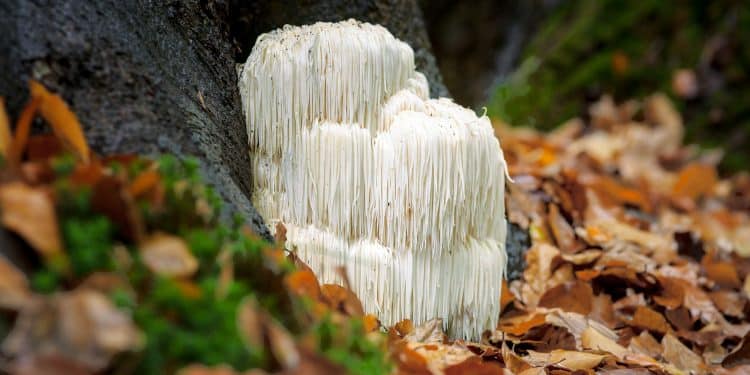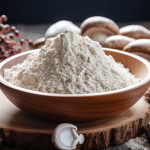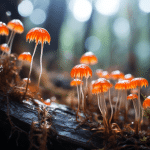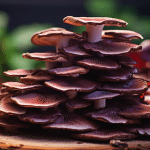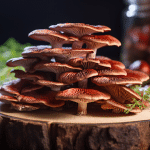While we cannot say that Lion Mane cures Parkinson’s, it definitely seems to be working against the disease. Hericium erinaceus has been shown to help with neurogenesis (brains neural growth). Parkinson’s does exactly the opposite, by eliminating an essential part of the brain as the illness progresses. Lions mane helps to stimulate neuron growth. The two appear to work directly against each other.
Let us dive deeper into the finer points of science surrounding Lion’s Mane for Parkinson’s Disease, and info on Neurogenesis.
Quick Look at What are Lion’s Mane Mushrooms?
Lions Mane (Hericium erinaceus) is a ridiculously healthy edible mushroom commonly found throughout North America, Asia, and Europe. Due to its numerous health benefits, lions mane has been used for centuries in traditional Chinese medicine. These medicinal mushrooms are saprotrophic, meaning that they eat organic material found in dead trees.
What is Parkinson’s Disease?
Parkinson’s is a progressive neurodegenerative disorder caused by a loss of nerve cells in parts of the brain that produce dopamine (mostly the portion called the substantia nigra). Because dopamine plays a major role in the regulation of body movements, the illness is manifested through rigidity and walking difficulties, though other symptoms can also occur, particularly as the illness progresses.
According to Parkinson’s Foundation, almost a million people in the United States are diagnosed with PD, and men are 1.5 times more likely than women to develop the condition. Worldwide, over 10 million people are living with this illness.
Parkinson’s Disease Symptoms
There are four main symptoms of parkinson’s disease:
- arm, leg, jaw, and head tremors
- slowness of movement
- limb stiffness
- balance and coordination impairment
Less common symptoms include depression and other mental health problems, urinary problems, constipation, sleeping problems, skin problems, and difficulties swallowing and talking. These symptoms are most common during later stages of the disorder.
Is Lion’s Mane Mushroom Good for Parkinson’s Disease?
Unfortunately, when it comes to lion manes effects on Parkinson’s, human studies are woefully lacking. However, mushrooms efficacy for treating other neurodegenerative diseases (such as the effects of Hericium erinaceus for Alzheimers), anecdotal usage, and few studies that are available, all point to the fact that lions mane may have tremendous benefits on Parkinson’s disease, particularly through its ability to repair damaged nerves and promote the growth new ones. Despite a lack of clear human studies about lions mane and Parkinson’s, here are some facts:
Lions mane has been shown to help with neurogenesis (neuronal cell growth).
Parkinson’s is a disease that kills neurons.
Lions mane and Parkinson’s are directly opposed: one favors the growth of, and the other degrades, neural cells.
You may make your own assumptions regarding Lions Mane and its effectiveness for treating Parkinson’s. We think it is fairly safe to assume that the mushrooms effects on the disease could be beneficial, particularly since there are no known adverse effects from lions mane.
What Does Lion’s Mane Do to Benefit the Brain?
When it comes to nerve regeneration, research shows that Lion Mane Extract is second to none. A study published in The Journal of Restorative Medicine investigated the neurological activities of lion’s mane mushroom. The results suggested that the bioactive compounds found in the lions mane (particularly hisicenone and erinacine) seem to possess neuroprotective and neuroregenerative properties.
A study from 2015 investigating the effects of medicinal mushrooms like Lignosus rhinocerotis (higher Basidiomycetes), aka Tigers Milk, and Hericium erinaceus, on neural growth. The results suggested that these adaptogenic mushrooms stimulated the outgrowth of neural fibers into the decoupled cells in brain, spinal cord, and retina, as well as promoted expression of neural growth factor genes.
Nerve Growth, Parkinson’s Disease, and Lion’s Mane Mushroom
An in vitro study investigated the effects of medicinal mushrooms, including Lions Mane, in neurodegenerative diseases, such as Alzheimers disease and Parkinson’s disease. Of 2,000 tested adaptogenic mushrooms, only a handful were confirmed to help with neural growth.
Hericium erinaceus, in particular, was shown to have benefits on neuronal health, because it has the ability to regenerate peripheral nerves and help with new neuron production (neurogenesis). A 50 microgram/mL extract of Lions Mane stimulates neural growth in brain, spinal cord, and retinal cells.
How Neurogenesis Influences Parkinson’s Disease
So, obviously, Lions Mane Mushroom Extract may help with the neuron production, increasing your Nerve Growth Factor (NGF) levels. But, could neurogenesis really improve symptoms of Parkinson’s disease? A comparative study that examined the effects of NGF on Parkinson’s disease development and severity. The results showed that decreased levels of NGF could reflect the continued neurodegenerative processes of Parkinson’s disease, because patients with the condition showed significant reductions in this proteins production at the late stages of the illness. Although further studies are needed regarding the effects of neural growth factor proteins in Parkinson’s disease, this is definitely a subject that is worth exploring, since it is very likely that NGF could be able to slow the progression of this illness.
Lion’s Mane Mushroom and Parkinson’s-Related Neurotoxicity
Studies of lion manes effects on Parkinson’s are few, but a few studies in animals have shown promise. For instance, one 2020 animal study looked at Hericium erinaceus effects on neurotoxicity related to Parkinson’s. According to the results of that study, mice given the lions mane extract showed less evidence of cytotoxicity to neurons due to the protective effects of erinacine A, the compound found in this adaptogenic mushroom.
Lion’s Mane Dosage for Parkinson’s Disease
To get the benefits that Lions Mane can provide Parkinson’s patients, you will need to consume the mushroom daily for at least one month. Start off at a lower dose (about 250mg) if you are not used to adaptogenic mushrooms, and gradually increase your dosage until you hit around 3,000mg or begin to see improvements in your symptoms.
What We Can Conclude About Lion’s Mane and Parkinson’s Disease
Heres what we currently know about the herbicium erinaceus and Parkinson’s disease. The neurotrophic effects of mane from the lion may prove enormously useful for treating and preventing Parkinson’s disease, according to studies both animal and cellular. The production of neural growth factor (NGF) proteins appears to slow down the progression of Parkinson’s disease, at least in animals. The neuroprotective effects of Hericium erinaceus could help treat Parkinson’s disease, and could slow cognitive decline associated with the disease.
Lions mane appears to protect against Parkinson’s-related neurotoxicity, at least in animals. More studies on humans are needed to unravel the potential mechanisms underlying lions mane and its effects in Parkinson’s disease. Given the lack of drawbacks of taking lions mane, its low cost, and high accessibility, it might make sense to incorporate the mushroom into your diet as a way of slowing down Parkinson’s.
